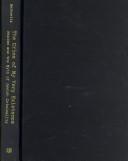| Listing 1 - 2 of 2 |
Sort by
|
Book
ISBN: 3839427347 Year: 2015 Publisher: Bielefeld transcript Verlag
Abstract | Keywords | Export | Availability | Bookmark
 Loading...
Loading...Choose an application
- Reference Manager
- EndNote
- RefWorks (Direct export to RefWorks)
During the last four decades the German Revolution 1918/19 has only attracted little scholarly attention. This volume offers new cultural historical perspectives, puts this revolution into a wider time frame (1916-23), and coheres around three interlinked propositions: (i) acknowledging that during its initial stage the German Revolution reflected an intense social and political challenge to state authority and its monopoly of physical violence, (ii) it was also replete with »Angst«-ridden wrangling over its longer-term meaning and direction, and (iii) was characterized by competing social movements that tried to cultivate citizenship in a new, unknown state. »Insgesamt leistet der Sammelband durch seinen zeitlichen, geographischen und thematischen Neuansatz einen wichtigen Beitrag zu einem neuen, vertieften Verständnis der Revolution von 1918/19.« Volker Stalmann, Historische Zeitschrift, 304 (2017) Lesenswert bereitet [der Band] auf die in den nächsten Jahren wohl kommenden Forschungen und Publikationen vor, indem er die deutsche Revolution gleichzeitig entprovinzialisiert [...] und reprovinzialisiert.« Thomas Blanck, H-Soz-u-Kult, 21.02.2017 Besprochen in: Critique, 43 (2015), Thomas Klinkauer Arbeit - Bewegung - Geschichte. Zeitschrift für historische Studien, 3 (2016), Axel Weipert German Politics and Society, 36 (2018), David Freis
Revolution; Violence; Social Movements; Subjectivity; Angst; Cultural History; Europe; German History; History of the 20th Century; European History; History --- Germany --- History --- Politics and government --- Angst. --- Cultural History. --- Europe. --- European History. --- German History. --- History of the 20th Century. --- History. --- Social Movements. --- Subjectivity. --- Violence.

ISBN: 1282772171 9786612772177 0520940687 1435601998 9780520940680 9781435601994 9781282772175 9780520251120 0520251121 9780520251144 0520251148 Year: 2007 Publisher: Berkeley University of California Press
Abstract | Keywords | Export | Availability | Bookmark
 Loading...
Loading...Choose an application
- Reference Manager
- EndNote
- RefWorks (Direct export to RefWorks)
The Crime of My Very Existence investigates a rarely considered yet critical dimension of anti-Semitism that was instrumental in the conception and perpetration of the Holocaust: the association of Jews with criminality. Drawing from a rich body of documentary evidence, including memoirs and little-studied photographs, Michael Berkowitz traces the myths and realities pertinent to the discourse on "Jewish criminality" from the eighteenth century through the Weimar Republic, into the complex Nazi assault on the Jews, and extending into postwar Europe.
Public opinion --- Jews --- Holocaust, Jewish (1939-1945) --- Propaganda, German --- National socialism. --- Antisemitism --- Hebrews --- Israelites --- Jewish people --- Jewry --- Judaic people --- Judaists --- Ethnology --- Religious adherents --- Semites --- Judaism --- Nazism --- Authoritarianism --- Fascism --- Nazis --- Neo-Nazism --- Totalitarianism --- World War, 1939-1945 --- Public opinion. --- Causes. --- History --- Causes --- Germany --- Ethnic relations. --- 20th century european history. --- 20th century jewish history. --- adolf hitler. --- antisemitism. --- auschwitz. --- concentration camps. --- criminality. --- european jews. --- extermination camps. --- gas chambers. --- genocide. --- ghettos. --- global conspiracy. --- historical. --- holocaust. --- human condition. --- jewish criminality. --- jewish displaced persons. --- jewish. --- jews and crime. --- jews. --- judaism. --- myths. --- nazi germany. --- nazi. --- nazism. --- postwar europe. --- second world war. --- self control. --- self perception. --- stereotypes. --- weimar republic. --- zionism.
| Listing 1 - 2 of 2 |
Sort by
|

 Search
Search Feedback
Feedback About UniCat
About UniCat  Help
Help News
News